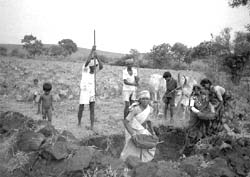Political harvest
Political harvest

Achampet mandal of Mahabubnagar district, Andhra Pradesh (AP), was in the clutch of drought six years ago. But it is doing well at present. “Satellite images show an improvement of about 300 per cent between February 1994 and March 1998 with regard to the groundwater table,” says Ramesh Reddy, head of the department of civil engineering at Osmania University, Hyderabad. He is also the chairperson of the Centre for Rural Youth Development (CRYD), a non-governmental organisation in Achampet.
In 1995 the people of this region, along with CRYD, took up the AP Groundwater Borewell Irrigation Scheme, known as APWELL in short. This scheme of the state government was aimed at watershed development to improve groundwater resources and recharge borewells. The scheme was made available in seven drought-affected districts and was a result of an agreement between the state government and the government of the Netherlands to fund watershed development.
In 1999-2000, the state faced a severe drought. More than 17 per cent of the habitations in the state face drinking water scarcity, says a May 2000 report by AP’s department of rural development. The government responded by putting its various programmes like APWELL into a concerted effort called the Neeru Meeru (Water and You) programme, which is the 12th part of the Janmabhoomi initiative of the of the ap state government. Janmabhoomi translates to motherland in English. Launched in May 2000 at the behest of the ap chief minister, N Chandrababu Naidu, Janmabhoomi aims to create self help groups







